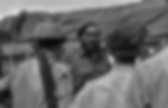

CIA Forced to Release Long Secret Official History of Bay of Pigs Invasion. Saving the Bay of Pigs Prisoners: Did JFK Send a Secret Warning to Fidel Castro – through Brazil? Washington, D.C., April 29, 2021 – John F.
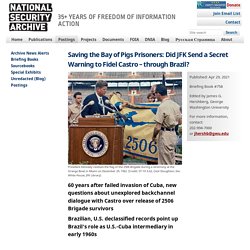
Kennedy may have secretly warned Fidel Castro against executing survivors of the Bay of Pigs invasion 60 years ago this month while also dangling a pledge of strict non-intervention if the Cuban leader spared their lives, according to new evidence posted today by the nongovernmental National Security Archive. Cuban Army Honors Fidel Castro With 21-Gun Firing Squad.
CIA SUCCESSFULLY CONCEALS BAY OF PIGS HISTORY. Operation Gladio: CIA Network of “Stay Behind” Secret Armies. Through NATO, working with various Western European intelligence agencies, the CIA set up a network of stay behind “secret armies” which were responsible for dozens of terrorist atrocities across Western Europe over decades.
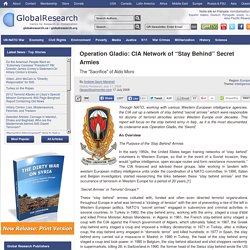
This report will focus on the stay behind army in Italy, as it is the most documented. Its codename was Operation Gladio, the ‘Sword’. An Overview The Purpose of the ‘Stay Behind’ Armies In the early 1950s, the United States began training networks of “stay behind” volunteers in Western Europe, so that in the event of a Soviet invasion, they would “gather intelligence, open escape routes and form resistance movements.” ‘Secret Armies’ or Terrorist Groups? These “stay behind” armies colluded with, funded and often even directed terrorist organizations throughout Europe in what was termed a “strategy of tension” with the aim of preventing a rise of the left in Western European politics. Last Nuclear Weapons Left Cuba in December 1962. Col.
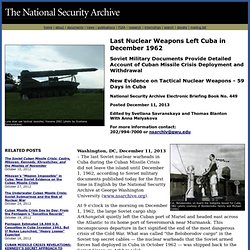
Beloborodov on board the Indigirka bound for Cuba, 1962 (photo courtesy of Beloborodov family and Michael Dobbs) The Cuban Missile Crisis, 1962: The Photographs. U.S. Court of Appeals Rejects CIA's Motion to Squash Lawsuit on Bay of Pigs History. JFK’s Lunatic Priorities During the Cuban Missile Crisis. Reading the transcripts of Kennedy’s meetings with his advisers is an object lesson in the pernicious effects of secrecy on government policy. No doubt Kennedy, in taping these meetings, intended them as a day by day record from which he would later select favourable tidbits to burnish his image for posterity. The Myth That Screwed Up 50 Years of U.S. Foreign Policy - By Leslie H. Gelb. U.S.

President John F. Pentagon Estimated 18,500 U.S. Casualties in Cuba Invasion 1962, But If Nukes Launched, "Heavy Losses" Expected. The Pentagon during the Cuban Missile Crisis Part I.
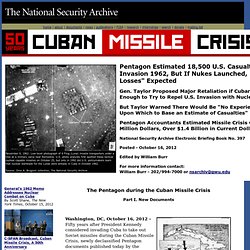
New Documents Washington, DC, October 16, 2012 – Fifty years after President Kennedy considered invading Cuba to take out Soviet missiles during the Cuban Missile Crisis, newly declassified Pentagon documents published today by the National Security Archive (www.nsarchive.org) describe the potentially catastrophic risks of the invasion including 18,500 American casualties in the first 10 days, even without any nuclear explosions. U.S. intelligence had detected at least one nuclear-capable short-range nuclear weapon launcher (the Luna/Frog) with the Soviet troops in Cuba, so Joint Chiefs chairman Gen. Maxwell Taylor told President Kennedy - in a crucial November 2, 1962 memorandum published here for the first time - that U.S. invasion plans were "adequate and feasible" as long as no battlefield nuclear weapons came into play.
Cuban missile crisis was a triumph of diplomacy, not brinksmanship. Cuban Missile Crisis 50th Anniversary: What this Cold War crisis should teach us about foreign policy today. AP/Wide World Photo/U.S.
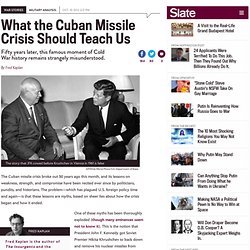
Department of State. The Cuban missile crisis broke out 50 years ago this month, and its lessons on weakness, strength, and compromise have been recited ever since by politicians, pundits, and historians. The problem—which has plagued U.S. foreign policy time and again—is that these lessons are myths, based on sheer lies about how the crisis began and how it ended. Fred Kaplan is the author of The Insurgents and the Edward R. Murrow press fellow at the Council on Foreign Relations. Follow One of these myths has been thoroughly exploded (though many eminences seem not to know it). But the other myth, no less pernicious in its impact (and no less false), still endures. In fact, however, the evidence—much of it declassified a decade ago from the Kremlin archives, and recounted in Khrushchev’s Cold War, a superb book by Aleksandr Fursenko and Timothy Naftali—reveals that it was Khrushchev who shipped the missiles out of weakness and insecurity.
Let’s back up. Cuba Almost Became a Nuclear Power in 1962 - By Svetlana Savranskaya. Cuba would have become the first nuclear power in Latin America 50 years ago, if not for the dynamics captured in this remarkable verbatim transcript -- published here for the first time -- of Fidel Castro's excruciating meeting with Soviet deputy prime minister Anastas Mikoyan, on November 22, 1962.

The document comes from the personal archive of his son, the late Sergo Mikoyan, which was donated to the National Security Archive and which appears for the first time in English this month in the new book, The Soviet Cuban Missile Crisis. Long after the world thought the Cuban Missile Crisis had ended, with Soviet leader Nikita Khrushchev's withdrawal of his medium-range nuclear missiles announced on October 28 -- and two days after President John F. Kennedy announced the lifting of the quarantine around Cuba -- the secret crisis still simmered. But Fidel Castro was livid. Castro's mood only got worse. This ended Cuba's hope to become a Latin American nuclear power.